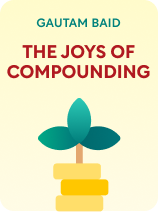

This article is an excerpt from the Shortform book guide to "The Joys Of Compounding" by Gautam Baid. Shortform has the world's best summaries and analyses of books you should be reading.
Like this article? Sign up for a free trial here.
Do you have a dream that you’ve yet to accomplish? Where do you even start to pursue your passion?
Just as a compass points north, The Joys of Compounding by Gautam Baid says your passions serve as a guide to a deeper, more fulfilling life. Consistently channeling your energy into these passions compounds the richness and joy of your life experiences.
Check out how to pursue your passion and make the most out of your life.
Pursue Your Passion
Baid breaks down the journey of learning how to pursue your passion into a three-step process:
1) Reflect on your interests: Identify activities or subjects that genuinely excite you and resonate with your values. These interests provide a roadmap to what truly matters to you. (Shortform note: If you’re struggling to identify your interests, Stanford professors Bill Burnett and Dave Evans (Designing Your Life) offer a practical way to hone in on them: Track what activities make you feel joyful, engaged, and energized. Then, zoom in on the details of each activity to identify what specifically engaged your interest. Pay particular attention to who you were with, what you were doing, where you were, and what you were interacting with (for example, people, objects, or a machine).)
2) Set specific goals: Choose one primary goal or project related to your identified interests and take immediate action to make progress. Setting clear objectives ensures that you’re actively working toward a more fulfilling life.
(Shortform note: Brendon Burchard (High Performance Habits) offers in-depth advice for setting clear objectives you can immediately act on. First, write down five major steps you need to take to achieve your goal. These are big steps that require many smaller tasks to achieve. For example, if your goal is to open a café, one major step might be to find a location. Then, under each of your five major steps, write down a list of tasks necessary to accomplishing that step. For example, for finding a location, tasks might be researching neighborhoods and comparing rents. Finally, create deadlines for each of these tasks and factor them into your daily schedule.)
3) Dedicate focused time: Allocate uninterrupted daily time to focus on your chosen goal or project. Minimizing distractions will maximize your productivity and enable you to make meaningful progress toward realizing your passion.
(Shortform note: Psychological research offers additional insights into how dedicating uninterrupted time maximizes productivity. When you only give tasks partial focus—by multitasking or giving in to distractions—you interrupt your brain from accessing and applying information stored in your mind. This slows your progress and makes your task feel laborious—thus, reducing your momentum. On the other hand, intense, full focus helps your brain effortlessly sift through and apply information stored in your brain, speeds up your progress, and makes your task feel enjoyable—thus, increasing your momentum.)
Use Your Passion to Help Others
Additionally, Baid argues that your passions become more meaningful when they involve leveraging your innate talents to benefit others. Therefore, he suggests that you identify your unique abilities, and explore ways to apply them to causes you care about or that make a positive impact on other people’s lives. For example, if you’re a skilled cook and feel concerned by the homelessness in your city, offer your culinary expertise to a local soup kitchen and serve meals to those in need.
(Shortform note: Daniel H. Pink (Drive) clarifies why using your talents to help others feels meaningful: You’re biologically wired to want to help other people. In other words, activities that contribute to the well-being of others feel “right” because they align with this natural inclination. Further, scientific research suggests that actively contributing to the well-being of others makes you happier: When you act with the intention of helping others, you activate the same parts of your brain that are stimulated by pleasurable activities such as eating good food or having great sex. This implication that your actions feel more pleasurable when they serve more people validates Baid’s advice.)

———End of Preview———
Like what you just read? Read the rest of the world's best book summary and analysis of Gautam Baid's "The Joys Of Compounding" at Shortform.
Here's what you'll find in our full The Joys Of Compounding summary:
- Why compounding isn't just a financial concept, but a transformative principle
- Strategies for compounding your well-being and happiness
- How to achieve steady and sustainable financial growth






